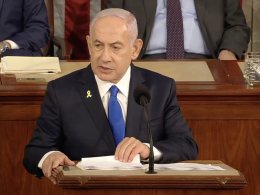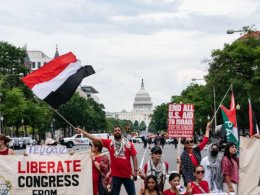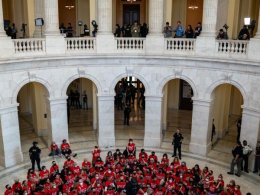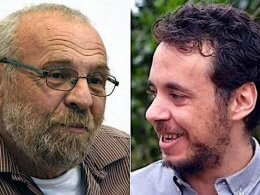 “Iran has blocked @instagram Live feature 3weeks before elections, after shutting Telegram calls: media. I can confirm mine isn't working” said Ali Noorani, a reporter for the AFP based in Tehran.
Another app, encrypted chat app Telegram Messenger, hugely popular with millions of users in Iran, conceded that its new voice calling features have been blocked by the country’s judiciary.
"In Iran, where Telegram has some 40 million active users, Telegram voice calls have been completely blocked by the country's internet providers and mobile operators following an order from the judiciary," Telegram CEO Pavel Durov announced on his channel.
The move appears to be an attempt by the country’s hardliners to exercise greater control over and possibly influence the outcome of next month’s presidential election.
“The mullahs know the power of the people; that has long been their Achilles’ Heel,” The Foreign Desk’s editor-in-chief Lisa Daftari said.
“We often seen this type of media and social media censorship, particularly since Iranians utilized so many social media and content-sharing platforms during the 2009 Green Revolution, demonstrating not only their disenchantment with their government, but also that they organize forces and go to the global stage with these grievances,” Daftari said.
Iran’s official election season commenced last week, with campaigning only permitted in the month preceding the election.
Elections in Iran are seen as somewhat symbolic around the world with candidates only allowed to run once approved by Iran’s Guardian Council, a body of clerics close to supreme leader Ayatollah Khamenei.
Voting takes place May 19 when voters will choose between the incumbent Hassan Rouhani and five other candidates approved by the council.
Despite securing a deal with world powers aimed at curbing Iran’s nuclear ambitions, President Rouhani’s political career appears to be under threat because he failed to bring the economic relief he promised, particularly in the aftermath of the nuclear deal and with the loosening of international sanctions.
“The harsh crackdowns against those who protested the 2009 election and since then, the imprisonment of those who posted anti-government posts on their Facebook pages has stifled the opposition and their momentum, but over the last 38 years, since Iran’s Revolution, we have seen significant political bursts when the opportunity arose,” Daftari said.
“The people may be fearful to crowd the streets again, but they are courageous enough to flood the web.”
Internet censorship in Iran
Whilst Iranians have access to the internet, the country operates on a highly censored “Halal Intranet,” with many external websites including social media networks such as Facebook and Twitter inaccessible.
The Iranian Revolutionary Guard began tracing Internet activity in the aftermath of the 2009 Green Revolution and in 2011, police forces formed the Iranian Cyber Police, or FATA, solely to counter Internet crimes.
The committee overseeing criminal Internet activity includes members from Iranian President Hassan Rouhani`s cabinet.
Ironically, Rouhani, Foreign Minister Javad Zarif and many other regime officials have become active on Twitter and Facebook and communicate globally through these platforms.
In recent years, Iranians have become accustomed to accessing mainstream social and information sites through third-party proxies in order to circumvent restrictions and avoid government surveillance.
“Iran has blocked @instagram Live feature 3weeks before elections, after shutting Telegram calls: media. I can confirm mine isn't working” said Ali Noorani, a reporter for the AFP based in Tehran.
Another app, encrypted chat app Telegram Messenger, hugely popular with millions of users in Iran, conceded that its new voice calling features have been blocked by the country’s judiciary.
"In Iran, where Telegram has some 40 million active users, Telegram voice calls have been completely blocked by the country's internet providers and mobile operators following an order from the judiciary," Telegram CEO Pavel Durov announced on his channel.
The move appears to be an attempt by the country’s hardliners to exercise greater control over and possibly influence the outcome of next month’s presidential election.
“The mullahs know the power of the people; that has long been their Achilles’ Heel,” The Foreign Desk’s editor-in-chief Lisa Daftari said.
“We often seen this type of media and social media censorship, particularly since Iranians utilized so many social media and content-sharing platforms during the 2009 Green Revolution, demonstrating not only their disenchantment with their government, but also that they organize forces and go to the global stage with these grievances,” Daftari said.
Iran’s official election season commenced last week, with campaigning only permitted in the month preceding the election.
Elections in Iran are seen as somewhat symbolic around the world with candidates only allowed to run once approved by Iran’s Guardian Council, a body of clerics close to supreme leader Ayatollah Khamenei.
Voting takes place May 19 when voters will choose between the incumbent Hassan Rouhani and five other candidates approved by the council.
Despite securing a deal with world powers aimed at curbing Iran’s nuclear ambitions, President Rouhani’s political career appears to be under threat because he failed to bring the economic relief he promised, particularly in the aftermath of the nuclear deal and with the loosening of international sanctions.
“The harsh crackdowns against those who protested the 2009 election and since then, the imprisonment of those who posted anti-government posts on their Facebook pages has stifled the opposition and their momentum, but over the last 38 years, since Iran’s Revolution, we have seen significant political bursts when the opportunity arose,” Daftari said.
“The people may be fearful to crowd the streets again, but they are courageous enough to flood the web.”
Internet censorship in Iran
Whilst Iranians have access to the internet, the country operates on a highly censored “Halal Intranet,” with many external websites including social media networks such as Facebook and Twitter inaccessible.
The Iranian Revolutionary Guard began tracing Internet activity in the aftermath of the 2009 Green Revolution and in 2011, police forces formed the Iranian Cyber Police, or FATA, solely to counter Internet crimes.
The committee overseeing criminal Internet activity includes members from Iranian President Hassan Rouhani`s cabinet.
Ironically, Rouhani, Foreign Minister Javad Zarif and many other regime officials have become active on Twitter and Facebook and communicate globally through these platforms.
In recent years, Iranians have become accustomed to accessing mainstream social and information sites through third-party proxies in order to circumvent restrictions and avoid government surveillance. Iran clamps down on social media apps ahead of election
Iran’s judiciary has reportedly shut down features within popular social media apps Instagram and Telegram ahead of next month’s presidential election.
Over the past two days, Instagram users in Iran report that they have not been able to upload or access “Instagram Live,” a hugely popular extension for the ubiquitous app that allows users to post short disappearing videos similar to Snapchat.
 “Iran has blocked @instagram Live feature 3weeks before elections, after shutting Telegram calls: media. I can confirm mine isn't working” said Ali Noorani, a reporter for the AFP based in Tehran.
Another app, encrypted chat app Telegram Messenger, hugely popular with millions of users in Iran, conceded that its new voice calling features have been blocked by the country’s judiciary.
"In Iran, where Telegram has some 40 million active users, Telegram voice calls have been completely blocked by the country's internet providers and mobile operators following an order from the judiciary," Telegram CEO Pavel Durov announced on his channel.
The move appears to be an attempt by the country’s hardliners to exercise greater control over and possibly influence the outcome of next month’s presidential election.
“The mullahs know the power of the people; that has long been their Achilles’ Heel,” The Foreign Desk’s editor-in-chief Lisa Daftari said.
“We often seen this type of media and social media censorship, particularly since Iranians utilized so many social media and content-sharing platforms during the 2009 Green Revolution, demonstrating not only their disenchantment with their government, but also that they organize forces and go to the global stage with these grievances,” Daftari said.
Iran’s official election season commenced last week, with campaigning only permitted in the month preceding the election.
Elections in Iran are seen as somewhat symbolic around the world with candidates only allowed to run once approved by Iran’s Guardian Council, a body of clerics close to supreme leader Ayatollah Khamenei.
Voting takes place May 19 when voters will choose between the incumbent Hassan Rouhani and five other candidates approved by the council.
Despite securing a deal with world powers aimed at curbing Iran’s nuclear ambitions, President Rouhani’s political career appears to be under threat because he failed to bring the economic relief he promised, particularly in the aftermath of the nuclear deal and with the loosening of international sanctions.
“The harsh crackdowns against those who protested the 2009 election and since then, the imprisonment of those who posted anti-government posts on their Facebook pages has stifled the opposition and their momentum, but over the last 38 years, since Iran’s Revolution, we have seen significant political bursts when the opportunity arose,” Daftari said.
“The people may be fearful to crowd the streets again, but they are courageous enough to flood the web.”
Internet censorship in Iran
Whilst Iranians have access to the internet, the country operates on a highly censored “Halal Intranet,” with many external websites including social media networks such as Facebook and Twitter inaccessible.
The Iranian Revolutionary Guard began tracing Internet activity in the aftermath of the 2009 Green Revolution and in 2011, police forces formed the Iranian Cyber Police, or FATA, solely to counter Internet crimes.
The committee overseeing criminal Internet activity includes members from Iranian President Hassan Rouhani`s cabinet.
Ironically, Rouhani, Foreign Minister Javad Zarif and many other regime officials have become active on Twitter and Facebook and communicate globally through these platforms.
In recent years, Iranians have become accustomed to accessing mainstream social and information sites through third-party proxies in order to circumvent restrictions and avoid government surveillance.
“Iran has blocked @instagram Live feature 3weeks before elections, after shutting Telegram calls: media. I can confirm mine isn't working” said Ali Noorani, a reporter for the AFP based in Tehran.
Another app, encrypted chat app Telegram Messenger, hugely popular with millions of users in Iran, conceded that its new voice calling features have been blocked by the country’s judiciary.
"In Iran, where Telegram has some 40 million active users, Telegram voice calls have been completely blocked by the country's internet providers and mobile operators following an order from the judiciary," Telegram CEO Pavel Durov announced on his channel.
The move appears to be an attempt by the country’s hardliners to exercise greater control over and possibly influence the outcome of next month’s presidential election.
“The mullahs know the power of the people; that has long been their Achilles’ Heel,” The Foreign Desk’s editor-in-chief Lisa Daftari said.
“We often seen this type of media and social media censorship, particularly since Iranians utilized so many social media and content-sharing platforms during the 2009 Green Revolution, demonstrating not only their disenchantment with their government, but also that they organize forces and go to the global stage with these grievances,” Daftari said.
Iran’s official election season commenced last week, with campaigning only permitted in the month preceding the election.
Elections in Iran are seen as somewhat symbolic around the world with candidates only allowed to run once approved by Iran’s Guardian Council, a body of clerics close to supreme leader Ayatollah Khamenei.
Voting takes place May 19 when voters will choose between the incumbent Hassan Rouhani and five other candidates approved by the council.
Despite securing a deal with world powers aimed at curbing Iran’s nuclear ambitions, President Rouhani’s political career appears to be under threat because he failed to bring the economic relief he promised, particularly in the aftermath of the nuclear deal and with the loosening of international sanctions.
“The harsh crackdowns against those who protested the 2009 election and since then, the imprisonment of those who posted anti-government posts on their Facebook pages has stifled the opposition and their momentum, but over the last 38 years, since Iran’s Revolution, we have seen significant political bursts when the opportunity arose,” Daftari said.
“The people may be fearful to crowd the streets again, but they are courageous enough to flood the web.”
Internet censorship in Iran
Whilst Iranians have access to the internet, the country operates on a highly censored “Halal Intranet,” with many external websites including social media networks such as Facebook and Twitter inaccessible.
The Iranian Revolutionary Guard began tracing Internet activity in the aftermath of the 2009 Green Revolution and in 2011, police forces formed the Iranian Cyber Police, or FATA, solely to counter Internet crimes.
The committee overseeing criminal Internet activity includes members from Iranian President Hassan Rouhani`s cabinet.
Ironically, Rouhani, Foreign Minister Javad Zarif and many other regime officials have become active on Twitter and Facebook and communicate globally through these platforms.
In recent years, Iranians have become accustomed to accessing mainstream social and information sites through third-party proxies in order to circumvent restrictions and avoid government surveillance.
 “Iran has blocked @instagram Live feature 3weeks before elections, after shutting Telegram calls: media. I can confirm mine isn't working” said Ali Noorani, a reporter for the AFP based in Tehran.
Another app, encrypted chat app Telegram Messenger, hugely popular with millions of users in Iran, conceded that its new voice calling features have been blocked by the country’s judiciary.
"In Iran, where Telegram has some 40 million active users, Telegram voice calls have been completely blocked by the country's internet providers and mobile operators following an order from the judiciary," Telegram CEO Pavel Durov announced on his channel.
The move appears to be an attempt by the country’s hardliners to exercise greater control over and possibly influence the outcome of next month’s presidential election.
“The mullahs know the power of the people; that has long been their Achilles’ Heel,” The Foreign Desk’s editor-in-chief Lisa Daftari said.
“We often seen this type of media and social media censorship, particularly since Iranians utilized so many social media and content-sharing platforms during the 2009 Green Revolution, demonstrating not only their disenchantment with their government, but also that they organize forces and go to the global stage with these grievances,” Daftari said.
Iran’s official election season commenced last week, with campaigning only permitted in the month preceding the election.
Elections in Iran are seen as somewhat symbolic around the world with candidates only allowed to run once approved by Iran’s Guardian Council, a body of clerics close to supreme leader Ayatollah Khamenei.
Voting takes place May 19 when voters will choose between the incumbent Hassan Rouhani and five other candidates approved by the council.
Despite securing a deal with world powers aimed at curbing Iran’s nuclear ambitions, President Rouhani’s political career appears to be under threat because he failed to bring the economic relief he promised, particularly in the aftermath of the nuclear deal and with the loosening of international sanctions.
“The harsh crackdowns against those who protested the 2009 election and since then, the imprisonment of those who posted anti-government posts on their Facebook pages has stifled the opposition and their momentum, but over the last 38 years, since Iran’s Revolution, we have seen significant political bursts when the opportunity arose,” Daftari said.
“The people may be fearful to crowd the streets again, but they are courageous enough to flood the web.”
Internet censorship in Iran
Whilst Iranians have access to the internet, the country operates on a highly censored “Halal Intranet,” with many external websites including social media networks such as Facebook and Twitter inaccessible.
The Iranian Revolutionary Guard began tracing Internet activity in the aftermath of the 2009 Green Revolution and in 2011, police forces formed the Iranian Cyber Police, or FATA, solely to counter Internet crimes.
The committee overseeing criminal Internet activity includes members from Iranian President Hassan Rouhani`s cabinet.
Ironically, Rouhani, Foreign Minister Javad Zarif and many other regime officials have become active on Twitter and Facebook and communicate globally through these platforms.
In recent years, Iranians have become accustomed to accessing mainstream social and information sites through third-party proxies in order to circumvent restrictions and avoid government surveillance.
“Iran has blocked @instagram Live feature 3weeks before elections, after shutting Telegram calls: media. I can confirm mine isn't working” said Ali Noorani, a reporter for the AFP based in Tehran.
Another app, encrypted chat app Telegram Messenger, hugely popular with millions of users in Iran, conceded that its new voice calling features have been blocked by the country’s judiciary.
"In Iran, where Telegram has some 40 million active users, Telegram voice calls have been completely blocked by the country's internet providers and mobile operators following an order from the judiciary," Telegram CEO Pavel Durov announced on his channel.
The move appears to be an attempt by the country’s hardliners to exercise greater control over and possibly influence the outcome of next month’s presidential election.
“The mullahs know the power of the people; that has long been their Achilles’ Heel,” The Foreign Desk’s editor-in-chief Lisa Daftari said.
“We often seen this type of media and social media censorship, particularly since Iranians utilized so many social media and content-sharing platforms during the 2009 Green Revolution, demonstrating not only their disenchantment with their government, but also that they organize forces and go to the global stage with these grievances,” Daftari said.
Iran’s official election season commenced last week, with campaigning only permitted in the month preceding the election.
Elections in Iran are seen as somewhat symbolic around the world with candidates only allowed to run once approved by Iran’s Guardian Council, a body of clerics close to supreme leader Ayatollah Khamenei.
Voting takes place May 19 when voters will choose between the incumbent Hassan Rouhani and five other candidates approved by the council.
Despite securing a deal with world powers aimed at curbing Iran’s nuclear ambitions, President Rouhani’s political career appears to be under threat because he failed to bring the economic relief he promised, particularly in the aftermath of the nuclear deal and with the loosening of international sanctions.
“The harsh crackdowns against those who protested the 2009 election and since then, the imprisonment of those who posted anti-government posts on their Facebook pages has stifled the opposition and their momentum, but over the last 38 years, since Iran’s Revolution, we have seen significant political bursts when the opportunity arose,” Daftari said.
“The people may be fearful to crowd the streets again, but they are courageous enough to flood the web.”
Internet censorship in Iran
Whilst Iranians have access to the internet, the country operates on a highly censored “Halal Intranet,” with many external websites including social media networks such as Facebook and Twitter inaccessible.
The Iranian Revolutionary Guard began tracing Internet activity in the aftermath of the 2009 Green Revolution and in 2011, police forces formed the Iranian Cyber Police, or FATA, solely to counter Internet crimes.
The committee overseeing criminal Internet activity includes members from Iranian President Hassan Rouhani`s cabinet.
Ironically, Rouhani, Foreign Minister Javad Zarif and many other regime officials have become active on Twitter and Facebook and communicate globally through these platforms.
In recent years, Iranians have become accustomed to accessing mainstream social and information sites through third-party proxies in order to circumvent restrictions and avoid government surveillance. 








